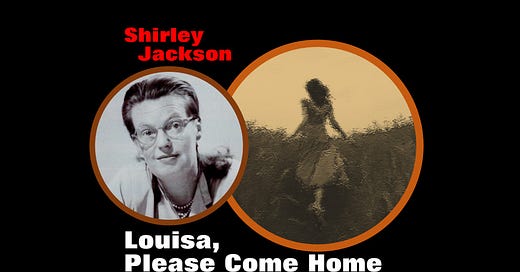First published in 1960, Louisa, Please Come Home is a missing girl story that is told in the past tense, and in the first person. It is one of at least two assumed to be inspired by the disappearance of seven people in the woods around Bennington, Vermont between 1945 and 1950.
By choosing the past tense and first person, Shirley Jackson makes this story subjective and retrospective, from the point of view of the missing girl, whom we meet as Louisa Tether, apparently hiding as Lois Taylor, the only one who knows what happened, and, yet, is prone to unreliable memory and confabulation.
That subjectivity seems innocent at first, but becomes important when we encounter the unexpected questions raised by the twist ending.
Apart from the obvious themes of girls gone missing, there's a number of familiar Shirley Jackson themes:
The family house as prison to be escaped.
The casual cruelty that occurs between family members.
Suspicious thinking, assumption, and even fantasy.
Children seeking their own new, surrogate, replacement parents.
The desire for new identity.
The masks worn in the pretence of happy family.
The ridiculousness of the theatre of social graces.
Our morbid fascination with tales of murder.
Yes, like all of Shirley Jackson’s short stories, the story may be simple, but it is packed with themes that become very familiar to the devoted reader.
Another Jackson trait comes through strongly in this story: the never-ending cyclic loop created when the opening paragraph and the closing paragraph is essentially the same. We had it in The Haunting Of Hill House. We have it here in of the desperate mother pleading for her girl to come home.
These cyclic loops make the nightmare inescapable, even by ending.
The thing is, though, how much of this story is fantasy? That’s the question that is begged of the reader, especially as they encounter the twist ending, which I have not, and will not, on this occasion, spoil.
The story can be read as anything from an essentially reliable account with a few unreliable memories to a complete and utter fabrication. That’s what’s fascinating about it. Every possibility along the spectrum between those two poles casts a different meaning on the twist ending.
Perhaps the biggest, darkest questions asked of all are whether we really delight in our capacity to be cruel to each other, and do we really want our lost children back when we've become used to them being gone for so long?
Louisa, Please Come Home is the second short story compiled in Penguin’s anthology called Dark Tales.




